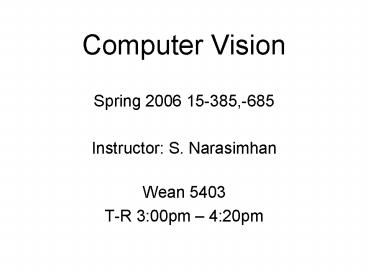Computer Vision PowerPoint PPT Presentation
Title: Computer Vision
1
Computer Vision
- Spring 2006 15-385,-685
- Instructor S. Narasimhan
- Wean 5403
- T-R 300pm 420pm
2
A Picture is Worth 1000 Words
3
A Picture is Worth 100,000 Words
4
A Picture is Worth a Million Words
5
A Picture is Worth a ...?
Neckers Cube Reversal
6
A Picture is Worth a ...?
Checker Shadow Illusion E. H. Adelson
7
A Picture is Worth a ...?
Checker Shadow Illusion E. H. Adelson
8
Human Vision
- Can do amazing things like
- Recognize people and objects
- Navigate through obstacles
- Understand mood in the scene
- Imagine stories
- But still is not perfect
- Suffers from Illusions
- Ignores many details
- Ambiguous description of the world
- Doesnt care about accuracy of world
9
Computer Vision
What we see
What a computer sees
10
Components of a Computer Vision System
Camera
Lighting
Computer
Scene
11
What is Computer Vision?
- Inverse Optics
- Intelligent interpretation of Imagery
- Building a Visual Cortex
- No matter what your definition is
- Vision is hard.
- But is fun...
12
Topics covered
13
Cameras and their Optics
Todays Digital Cameras
The Camera Obscura
14
Biological Cameras
Mosquito Eye
Human Eye
15
Image Processing
Image enhancement Feature detection
Fourier Transform Sampling, Convolution
16
Surface Reflectance
CURET
17
Lightness and Perception
Checker Shadow Illusion E. H. Adelson
18
3D from Shading
Photometric Stereo
Shape from Shading
19
Binocular Stereo
20
Optical Flow
21
Range Scanning and Structured Light
22
Statistical Techniques
Least Squares Fitting
23
Statistical Techniques
- Principle Components Analysis (PCA)
- Face Recognition
24
Some Recent Trends in Vision
Novel Cameras and Displays
Topics change every year
25
Advanced Related Courses at CMU
- Graduate Level Computer Vision (Hebert, Fall)
- Advanced Perception (Efros, Spring)
- Appearance Modeling (Narasimhan, Fall)
- Advanced Mobile Robotics (Whittaker,
Spring/Summer) - Many other special topics courses offered
irregularly.
26
Course Logistics
27
Text, Readings
- Class Notes (required)
- Text, Robot Vision, B.K.P.Horn, MIT Press
- (recommended)
- Supplementary Material (papers, tutorials)
28
Course Schedule
1/17/2006 Introduction and Course
Fundamentals PART 1 Cameras and
Imaging 1/19/2006 Image Formation and
Projection 1/24/2006 Matlab
Review 1/26/2006 Image Sensing Homework 1
OUT PART 2 Signal and Image
Processing 1/31/2006 Binary Image Processing
2/2/2006 1D Signal Processing Homework 1
DUE Homework 2 OUT 2/7/2006 2D Image
Processing 2/9/2006 Edge Detection 2/14/2006 I
mage Pyramids 2/16/2006 Hough
Transform Homework 2 DUE Homework 3 OUT PART
3 Physics of the World 2/21/2006 Basic
Principles of Radiometry 2/23/2006 Retinex
Theory 2/28/2006 Surface Reflectance and
BRDF 3/2/2006 Photometric Stereo Homework 3
DUE 3/7/2006 Midterm Review 3/9/2006 Midter
m Exam 3/13/2006 Midterm Grades
Due 3/21/2006 Shape from Shading Homework 4
OUT
29
Course Schedule
PART 4 3D Geometry 3/23/2006 Binocular
Stereo 1 3/28/2006 Binocular Stereo
2 3/30/2006 Motion and Optical
Flow 4/4/2006 Line Drawing Homework 4 DUE
Homework 5 OUT 4/6/2006 Structured
Light PART 5 Statistical Techniques 4/11/2006
Linear Least Squares 4/13/2006 Principle
Components Analysis 4/18/2006 Applications of
PCA Homework 5 DUE Homework 6 OUT PART 6
Current Trends and Challenges in Vision
Research 4/27/2006 Novel Cameras and
Displays 5/2/2006 Open challenges in vision
research 5/4/2006 Review Class Homework 6
DUE 5/9/2006 Final Exam 5/18/2006 Final
Grades Due
Use as a guidechanges possible
30
Prerequisites
- Basic Linear Algebra, Probability, Calculus
Required - Basic Data structures/Programming knowledge
- No Prior knowledge of Computer Vision Required
31
Grading
- FIVE Assignments 60
- ONE Midterm 15
- ONE Final 25
- ONE Extra Assignment for Graduate Students
- Most assignments include analytic and
programming parts. - All assignments must be done individually.
- Programming Environment Matlab.
- Assignments due BEFORE class submitted using
Blackboard. - Late Assignments ZERO Credit.
32
Office Hours
- Narasimhan NSH 4117, Tuesdays 430pm 530pm
- Email srinivas_at_cs.cmu.edu
- Yan Ke Location??, Mondays 100pm
200pm - Email yke_at_cmu.edu
- Nik Melchior NSH 1612E, Wednesdays 100pm
200pm - Email melchior_at_cmu.edu
- Technical Questions Post on bboard, we will
answer. - 5 Extra Credit for students answering bboard
questions regularly.
33
Next Class
- Image Formation
- Horn, Chapter 2

